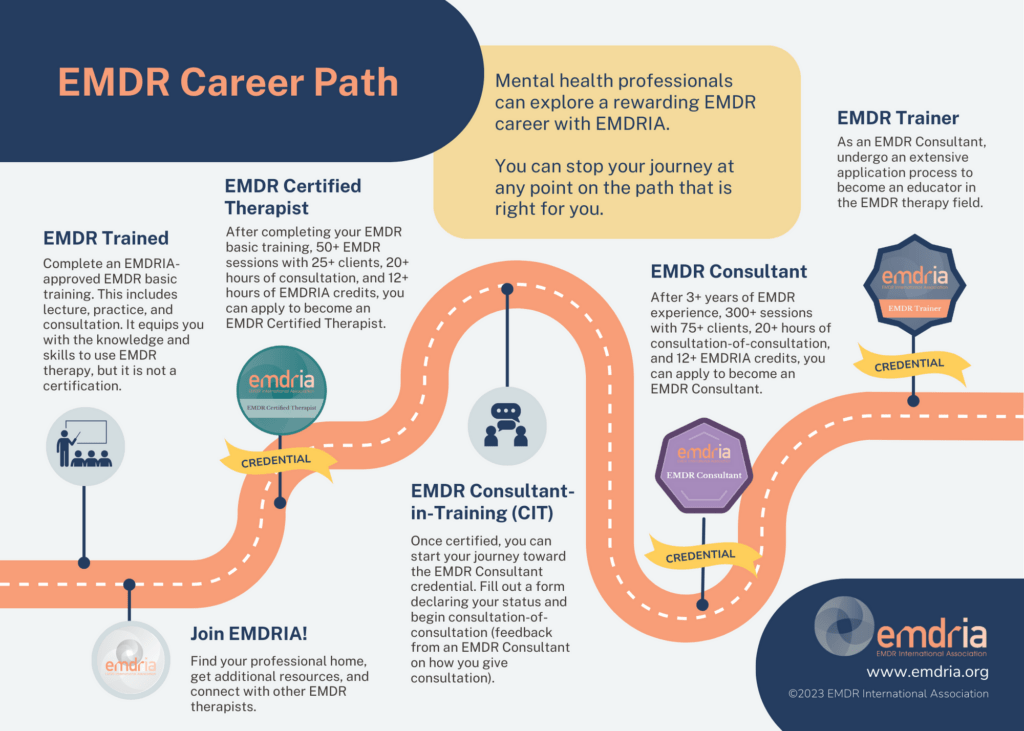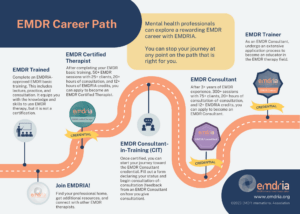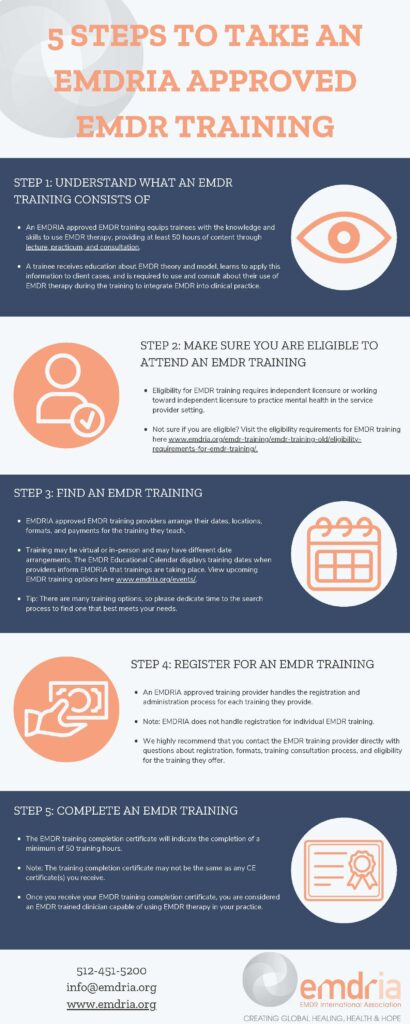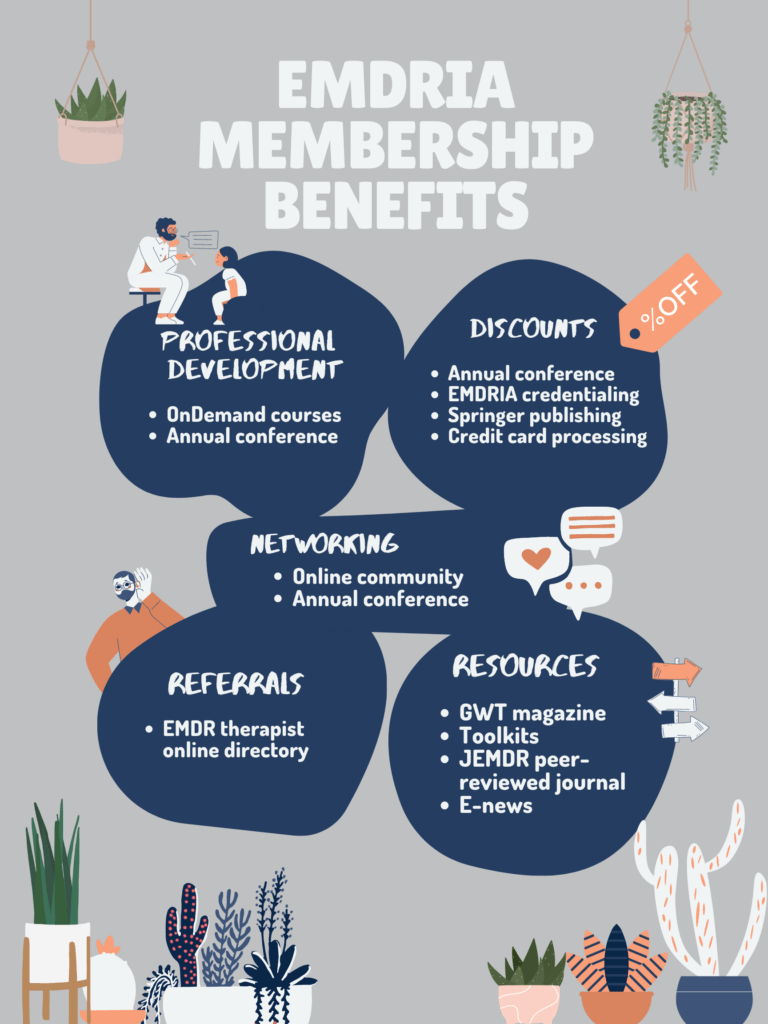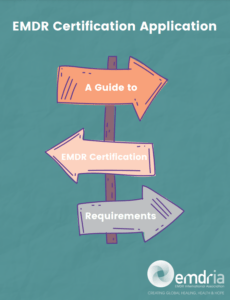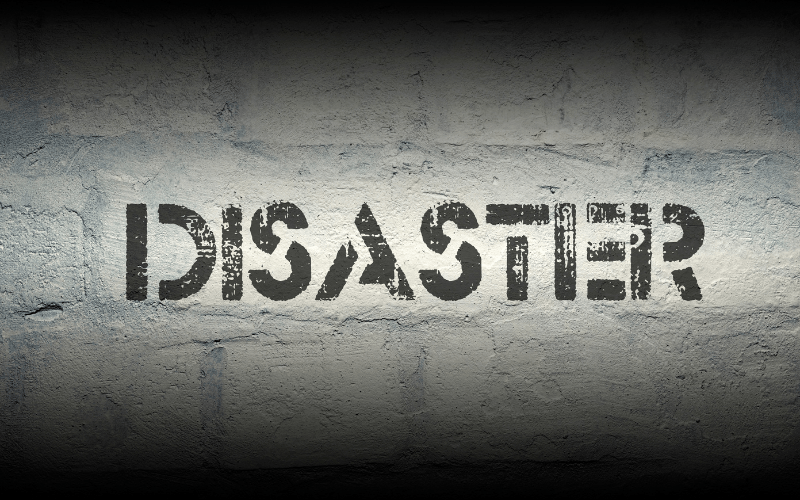- If I want to be trained in EMDR therapy does that mean I will be certified in EMDR?
- Is certification required to practice EMDR therapy?
- Do I need to be licensed as a mental health professional to be EMDR trained or certified?
- How do I become an EMDR Consultant?
These are just a few questions we regularly get here at EMDRIA. We have designed a pathway for EMDR therapists to cultivate their clinical skills, knowledge, and competence. Here’s a breakdown of the EMDR therapist journey.
EMDRIA Approved EMDR Basic Training
It all starts with the EMDR basic training. An EMDRIA Approved EMDR Basic Training provides trainees with the knowledge and skills to use EMDR therapy. This initial EMDR training provides at least 50 hours of content to the trainee that includes:
-
-
- Lecture – learning from slides and training materials.
- Practicum – “learning by doing” when trainees practice using EMDR therapy with other trainees at the training.
-
- Consultation – “real-life learning” when trainees begin to use EMDR therapy with their clients while receiving consultation from the EMDRIA EMDR Trainer’s team.
Trainees are required to use—and consult about their use—of EMDR therapy during the training. This helps to integrate EMDR concepts into clinical practice. In addition, trainees learn about the EMDR theory and model (the Adaptive Information Processing – AIP – model) and how to view a client case through the AIP lens.
To be eligible to take an EMDRIA Approved EMDR Basic Training, someone must be independently licensed or working toward independent licensure to practice mental health in their state and setting. EMDR therapy is a comprehensive mental health psychotherapy model and treatment, so it is important to establish that a trainee is licensed to provide mental health psychotherapy.
Once it is clear that a therapist is eligible for the EMDRIA Approved EMDR Basic Training, they will want to find an EMDR training. Both virtual and in-person trainings are available. EMDRIA EMDR Trainers let EMDRIA know about the dates of their trainings, and trainees can find out more about these options on our Find an EMDR Basic Training page. Remember that trainees register directly with the EMDR Trainer’s organization, not EMDRIA. When a therapist has completed the EMDRIA Approved EMDR Basic Training, they are considered EMDR Trained (EMDRIA).
EMDRIA Membership
When the initial EMDR training is completed, EMDRIA invites trainees to become EMDRIA Members. We think it is vital for new EMDR therapists to feel supported in developing EMDR skills by engaging with the community of dedicated EMDRIA Members. EMDRIA annual membership benefits include access to online communities, Go With That magazine publication issues, online resources, most recent issues of the Journal of EMDR Practice and Research, discounts on our annual conferences, and continuing education programs. In addition, Full members receive a profile listing in our Find an EMDR Therapist directory.
EMDR Certified Therapist
Once someone has completed the EMDR basic training and their independent licensure to practice mental health, they are eligible to become an EMDR Certified Therapist. EMDR Certification is the next step to honing EMDR therapy skills, but is not required to practice EMDR therapy. It is an additional credential that some
EMDR therapists pursue to show dedication to clinical excellence and ongoing growth in the field. Being an EMDR Certified Therapist indicates that someone has undertaken further consultation, sharpened clinical practice skills, and plans to continue an EMDR education. Marketing as an EMDR Certified Therapist reinforces commitment to EMDR therapy excellence. We are very excited to roll out credentialing badges this year so an EMDR Certified Therapist can display this accomplishment on their marketing materials.
We get a LOT of questions about this process.
- What is the difference between EMDR training and EMDR Certification? EMDR-trained therapists have completed the initial training. EMDR Certified Therapists have honed knowledge and skills beyond the initial training. Both designations can utilize EMDR therapy in their clinical practice.
- What is the difference between EMDRIA Membership and EMDR Certification? EMDRIA Members receive benefits and community. EMDR Certification is a credential and professional accomplishment.
- What goes into the EMDR Certification application process? “A Guide to EMDR Certification Application” outlines everything an applicant needs to know. The criteria for the EMDR Certification application are listed on the Certification Application page on our website.
- What is the EMDR Certification renewal process like? Earn 12 EMDRIA credit hours every two years, and renew online.
- What do I look for in an EMDR Consultant? How do I get the most out of EMDR consultation? Check out our Certification Consultation Tips. Get familiar with the requirements, interview consultants, and sign a contract with a consultant.
- How do I access my EMDR Certification badge? Once your certification application is approved, you will receive your digital badge to show and share your professional status.
- I still have questions. Check out our EMDR Certification FAQ.
EMDR Consultant-in-Training
Once an EMDR Certified Therapist has completed the certification process, they can work toward becoming an EMDR Consultant as a consultant-in-training (CIT). An EMDR Consultant-in-Training (CIT) participates in consultation-of-consultation. Another way of saying this is that a CIT receives consultation on the way they give consultation to another person seeking help with EMDR skills. The nature of CIT consultation is different from certification or basic training consultation as it considers and evaluates the CIT’s teaching and guiding abilities. Although the EMDR CIT is being evaluated more on how they give feedback and guidance, they still need to have the foundational knowledge from their EMDR basic training and the EMDR Certification process. The EMDR CIT process begins by filling out the CIT Declaration Form and ends when the CIT’s application for EMDR Consultant is approved.
EMDR Consultant
EMDR Consultants play a vital role in the EMDR therapist journey. They provide EMDR consultation to therapists seeking to expand their EMDR skills. They are encouragers, gatekeepers, mentors, and knowledge holders for others on the EMDR journey. EMDR Consultants also hold a lot of responsibility. They are expected to provide up-to-date and relevant information regarding the utilization of standard EMDR therapy with various client populations. A great EMDR Consultant can recognize their limits of competency and can be transparent with these limits, referring out when appropriate. EMDR Consultants should be familiar with the services they are providing (basic training consultation, certification, or CIT consultation), the application criteria that the consultees are working on, and have a wide network of resources to provide to consultees. Utilizing a transparent contractual agreement lends structure to the consultation interactions. Effective communication is a key quality for the consultant role.
The most important tool for an EMDR Consultant is the Consultation Packet. This packet provides example evaluation forms, consultation contracts, and case presentation forms. An EMDR Consultant has earned the top professional status of the EMDRIA credentialing journey and can proudly display the consultant badge to show and share this accomplishment.
EMDR Trainer
Some EMDR therapists are so passionate about EMDR therapy that they choose to put in the work and become EMDR Trainers. The updated EMDR Basic Training Policies and Requirements outline the basic expectations for both trainers and trainees.
The Standards for EMDR Basic Training are more comprehensive, and outline expectations for people that wish to provide an EMDRIA Approved EMDR Basic Training, including the curriculum requirements. The curriculum requirements aim to provide baseline knowledge and proficiency in EMDR therapy. An EMDR Trainer with EMDRIA is expected to create a complete integrated training program that provides future EMDR therapists the knowledge and skills to utilize EMDR therapy and incorporates learning through lecture, practice, and integrated consultation. In addition, the EMDR training curriculum should include a comprehensive understanding of case conceptualization and treatment planning and the ability to integrate EMDR therapy into clinical practice. There have been some recent updates to the EMDR Trainer Application process with EMDRIA.
Back to Focal Point Blog Homepage
Additional Resources
If you are a therapist interested in the EMDR training:
- Learn more about EMDR at the EMDRIA Library
- Learn more about EMDR Training
- Search for an EMDR Training Provider
- Check out our EMDR Training FAQ
If you are EMDR trained:
- Check out EMDRIA’s Let’s Talk EMDR Podcast
- Check out the EMDRIA blog, Focal Point
- Learn more about EMDRIA membership
- Search for Continuing Education opportunities
If you are an EMDRIA Member:
- Learn more about EMDR Consultation
- Find clinical practice articles in EMDRIA’s Go With That Magazine
- Search for articles in Journal of EMDR Practice and Research in the EMDRIA Library
Date
January 27, 2023
Practice & Methods
Your EMDR Practice

